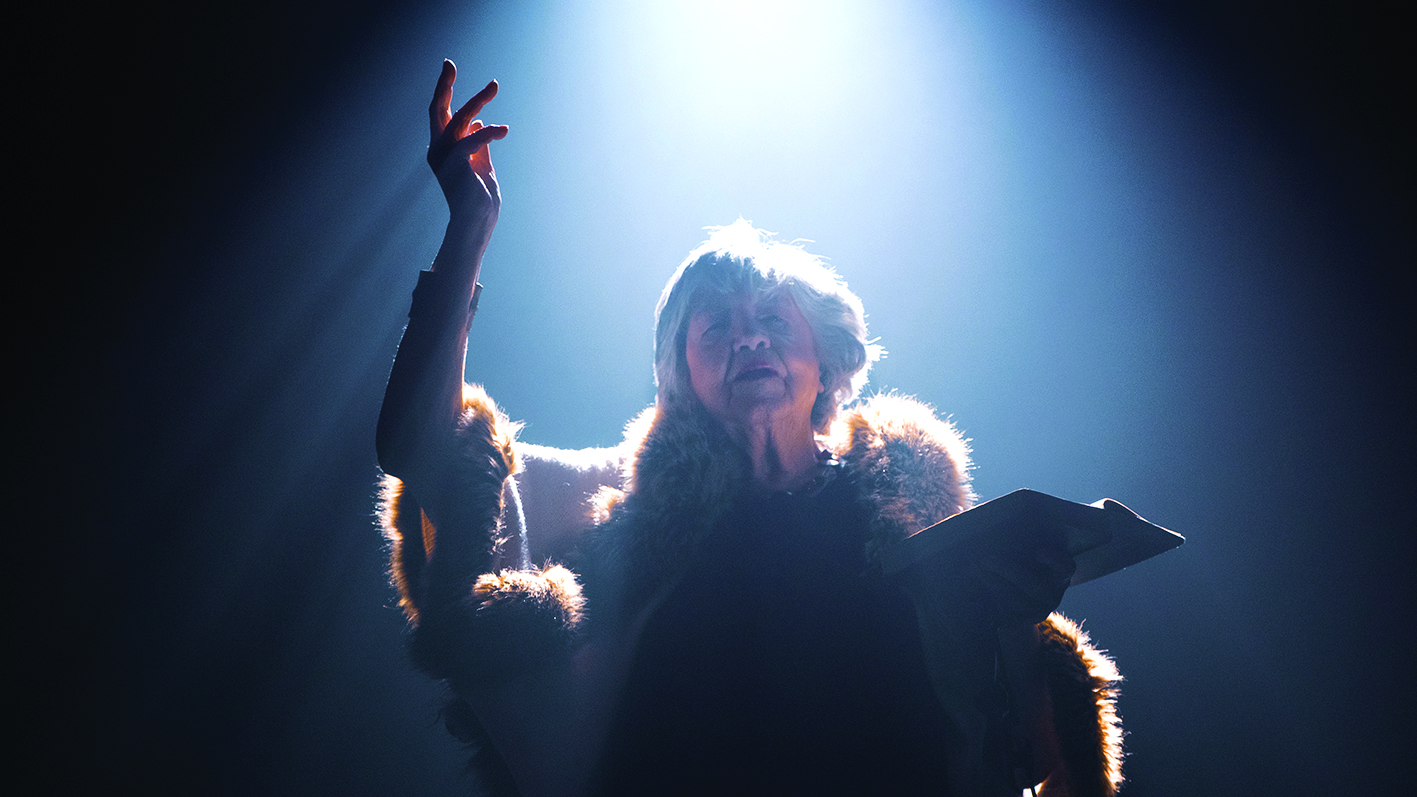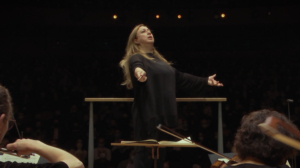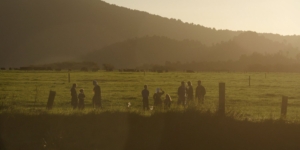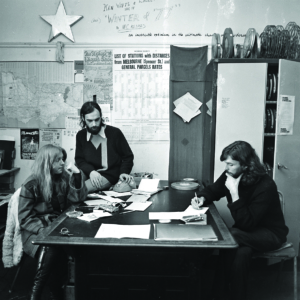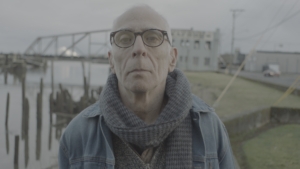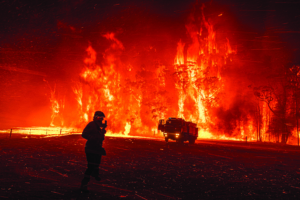The remarkable French filmmaker Robert Bresson once wrote, in his poetic musing on the craft Notes on the Cinematograph, that creating a film involves both birth and death:
My movie is born first in my head, dies on paper; is resuscitated by the living persons and real objects I use, which are killed on film but, placed in a certain order and projected onto a screen, come to life again like flowers in water.[1]Robert Bresson, Notes on the Cinematograph, trans. Jonathan Griffin, New York Review Books, New York, 2016 [1975], p. 5.
This quote springs to mind when interviewing mother–daughter directorial team Cathy Henkel and Sam Lara about capturing their deeply personal documentary Laura’s Choice. Premiering at the Revelation Perth International Film Festival in December 2020 and broadcast on the ABC in March 2021 as a two-part series,[2]This article is based on a viewing of the feature version. the film traces the journey of Laura Henkel – Cathy’s mother and Sam’s grandmother – to end her life on her own terms. We see the two filmmakers follow her, somewhat reluctantly at first, to the end point of a voluntary-assisted-dying clinic in Switzerland. A team from Vienna were called in to record that moment so that Cathy and Sam could be fully present; later, they had the surreal experience of watching Laura’s death again in the edit many times, and then seeing her full of life once more – like flowers in water. ‘You know, I wouldn’t recommend it to anyone,’ Cathy says, wryly. ‘After a while […] it became a bit bizarre, that we could watch my mother die thirty to forty times.’
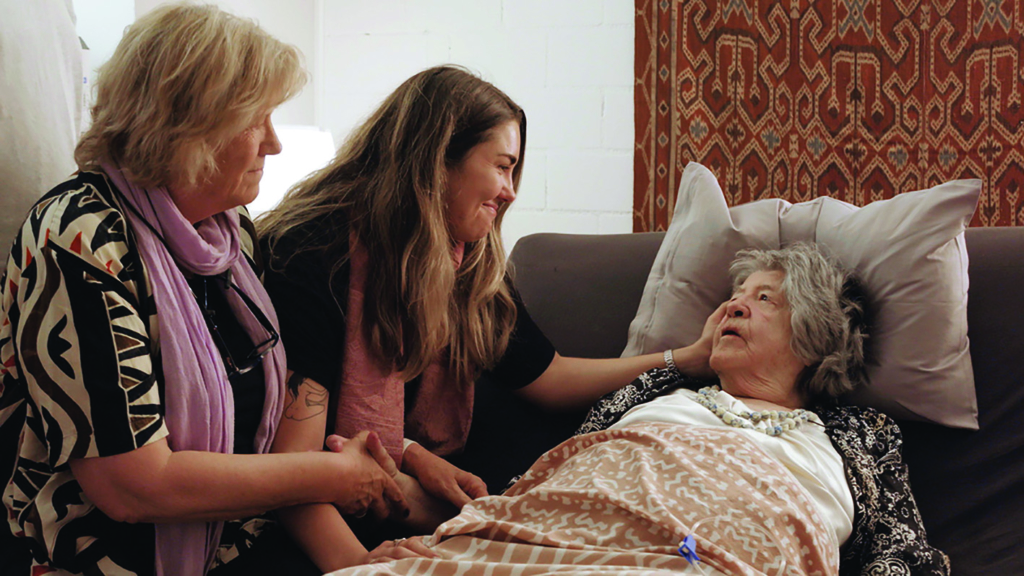
The uncanniness of that Groundhog Day–like situation eventually lent a certain level of immunity, but that was banished by a screening in Laura’s home town of Ballina, Cathy says. ‘We showed it to her friends and community – doctors and nurses, people who’d known her – and there was audible sobbing in the theatre. And I felt that one very profoundly.’ But Cathy and Sam also had to be directors, often cutting beautiful scenes from the final version. Sam first watched the death footage alongside the film’s editor, Nicholas Dunlop, as they navigated four years worth of home-video material. ‘There’s probably twenty hours of my grim video diaries,’ Sam notes. ‘I have no ego left after this film.’
This generous act of cinema thrums with heart and humour, thanks in large part to the indomitable spirit of Laura, who does not suffer fools gladly and enjoys an irreverent view of the world. Dunlop helped Cathy and Sam to hold on to her gallows humour in the film. ‘He’s a beautiful human, and a very skilled editor,’ Cathy says. ‘From the get-go, he fell in love with my mum. I think that was really important, that he brought that affection and respect for her to the storytelling.’
Dunlop himself is a hilarious guy, she notes. ‘And my mum, it turns out, was very funny. And sometimes even we [Cathy and Sam] were funny.’ As is so often the case when family and friends rally together at the end, there is, Cathy says, ‘a lot of life and a lot of joy, even though you’re dealing with death’.
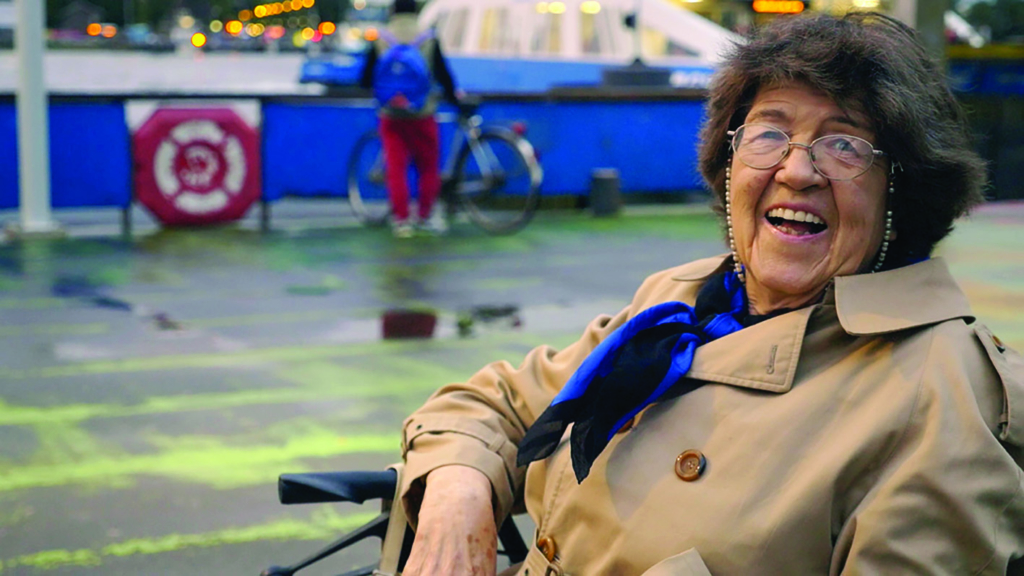
Safe passage
The journey to the end of Laura’s life begins in Europe. We meet her gleaming at the spritely age of eighty-seven, travelling with Sam in 2016 for a two-week river cruise tracing the bustling waterways from Amsterdam to Budapest. The trip will take in the older woman’s lifelong dream of visiting Vienna, but, tragically, by the time they arrive, things have taken a terrible turn. An unfortunate accident occurs while the pair are tilting at windmills in the Netherlands, hospitalising Laura for weeks. As pneumonia creeps in, Laura’s will to live seeps out. Sam is paralysed with guilt over her role in the incident, though her grandmother refuses to entertain this. On returning to Australia, Laura sets herself to determining her own exit, as opposed to fading away. But the scattershot state-based assisted-dying laws in Australia – where they are even available at all – are only applicable to those in the late stages of a terminal illness, an imposition that infuriates Laura.
We’re privy to astounding footage in which the mother announces to her daughter her intention to take her own life, and requests her assistance in doing so, right then and there.
The first seedling that would grow into this powerful film was sown when Laura summoned Cathy to her Ballina home in 2017. We’re privy to astounding footage – a result of Laura’s request for Cathy to film this – in which the mother announces to her daughter her intention to take her own life, and requests her assistance in doing so, right then and there. When Cathy begs for time to consider what would essentially be a crime in this country, not to mention an unimaginable emotional ordeal, the pause leads Laura to research other opportunities. This leads her instead to Switzerland, where voluntary-assisted-dying laws do not require a terminal diagnosis, only a personal decision by a sound mind.
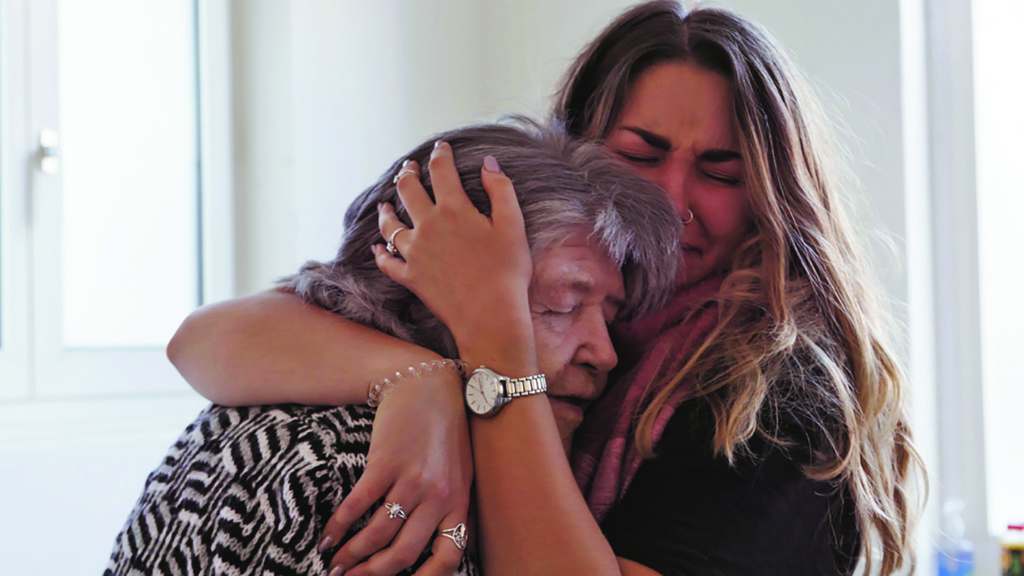
Kill your darlings
Laura’s Choice is a testament to family, love and the ability to let go, but how on Earth do you shoot a film about the proactive death of your own mother or grandmother? For Cathy, a seasoned documentary filmmaker with a particular focus on environmental activism,[3]She has previously directed the environmentally focused documentaries The Burning Season (2008) and Rise of the Eco-Warriors (2014). there was some precedent. She explored fraught familial history on screen in another movie that screened on the ABC, The Man Who Stole My Mother’s Face (2003), in which she set about finding the man who had sexually assaulted Laura. ‘That territory was very difficult, and back then I was a less experienced filmmaker,’ Cathy says. ‘I had a lot of trauma and I vowed I would never [make a film about family trauma] again,’ she adds. While she has learned a lot from her mistakes, it is a vow she has clearly broken with Laura’s Choice.
Recalling her and Sam’s initial reluctance, she says it became a matter of ‘rambling through’ to respect Laura’s wishes, finding succour in her pride at Sam’s filmmaking abilities. Sam won the Best Youth Short Film prize at the 2015 St Kilda Film Festival for Off Track – about a daughter making the most of life while facing down the terminal illness of a parent – and more recently accrued nominations for her short Featherweight at both the 2019 Sydney Film Festival and the following year’s Australian Directors’ Guild Awards. ‘She has really terrific instincts, and I saw that from the start,’ Cathy says.
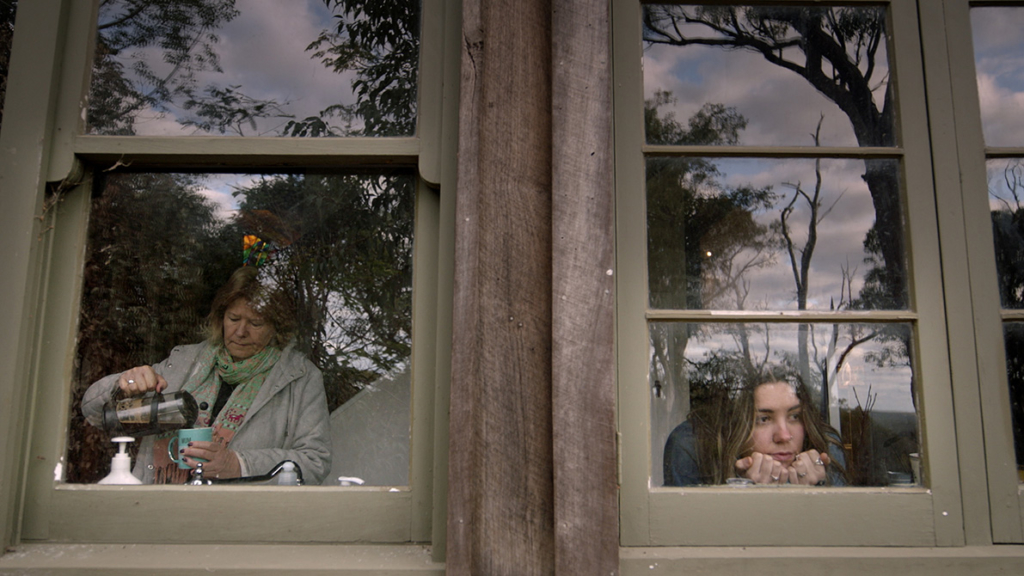
Sam reveals that she and her mother coped with the pressures of reliving traumatic events by discussing one another in the third person during the edit:
So it was the Sam character, the Cathy character and the Laura character. Just being able to say, ‘I think in this moment, Sam’s character was feeling this,’ helped us separate our own experience.
That and a lot of therapy, she adds. Sam’s passion for filmmaking also helped carry her through. ‘When you’re doing what you love, you find a way.’
The film honours Laura’s activist cry for voluntary dying. It is not Sam’s or her mother’s fight, per se. ‘I felt pretty clearly for most of this filmmaking process that I was making this film about my grandma’s wishes,’ she says. That’s not to say that she isn’t passionate about the conversations that have arisen from the film. She and her mother attempted at one point to interview each other on camera for the project, but Sam jokes that it came across ‘like some kind of Channel 7 exposé’. Instead, they holed up in a cabin for four days and shared their recollections over eight hours of footage. She recalls:
We were able to say things to her that we didn’t get an opportunity to say, and to really just let her know how we felt in a way that felt really honest to us.
Much of this heart-to-heart lies on the cutting-room floor, with only around ten minutes making it into the film as connective tissue. ‘It was a very cathartic emotional exorcism,’ Sam says. But the emotional heft of it remains, benefiting Laura’s Choice a great deal.
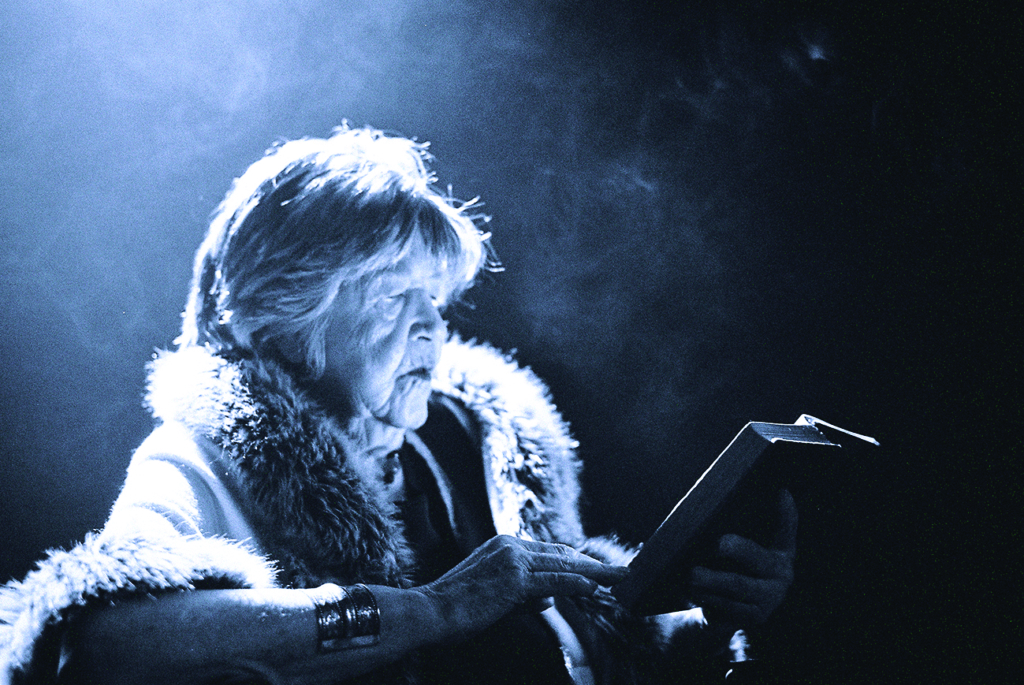
Out, out, brief candle
Laura’s Choice is a deeply personal film, but the national conversation flickers, casting a long and universal shadow. According to progressive think tank The Australia Institute’s polling, four in five Australians support some form of voluntary assisted dying.[4]The Australia Institute, ‘Polling – Voluntary Assisted Dying and the Territories’, 2021, p. 1, <https://australiainstitute.org.au/wp-content/uploads/2021/04/Polling-April-2021-Voluntary-assisted-dying-and-the-territories-Web.pdf>, accessed 22 May 2021. While the film is tightly focused on Laura, it’s clearly her wish to champion the rights of others to follow in her footsteps. The film also touches on the plight of assisted-dying activist Belinda Teh, who was so scarred by her mother’s agonising death that she became a prominent campaigner for the cause, walking from Melbourne’s Parliament House to meet Premier of Western Australia Mark McGowan at the equivalent building in her home town of Perth.[5]See Shannon Molloy, ‘Mareia Teh’s Agonising Final Hours of Life Haunted Her Daughter Belinda, so She Started Walking’, News.com.au, 6 August 2019, <https://www.news.com.au/lifestyle/health/mareia-tehs-agonising-final-hours-of-life-haunted-her-daughter-belinda-so-she-started-walking/news-story/e379d82f05c784a4c8bea78750246f8c>, accessed 24 May 2021. Sam, who has become close with Teh, says she helped inform the filming process, as well as their own response to Laura’s wishes: ‘Hearing what she went – and very much continues to go – through makes me feel so lucky to have had what we had with Laura, but it still wasn’t easy.’
Cathy insists, ‘It’s not Sam and I advocating for government change; we just see the film playing a really useful role in getting people talking.’ Judging by the community responses on the film’s associated website Laura’s Kitchen Table,[6]See Laura’s Kitchen Table,<https://lauraskitchentable.circle.so/c/welcome>, accessed 22 May 2021. Laura’s assertion that one shouldn’t have to be in one’s final six months to make that call is shared by many. Sam is passionate about the impact of the site. ‘The conversation is happening there, with people talking to their grandparents and the elderly people in their life,’ she says. It’s them we should be listening to, she suggests.
I don’t feel like I’m the right voice for this fight. I have no idea what it’s like to be old. But I know what it’s like to be young and to learn from your grandparents. And that’s what I want to share. That’s how much Laura taught me about death, and what it means to be human.
Both directors have been deeply affected by older Australians who, inspired by Laura, have reached out to one another on the site. ‘It’s so good seeing all these elderly people connecting from around Australia, finally having somewhere to talk about this,’ Sam says. ‘It makes me want to cry.’ Posters tend to shut down the odd bit of infuriated moral resistance as forcefully as Laura would, were she still here. Cathy says:
My mum insisted that we don’t shut her down. Don’t disrespect her and ignore her or tell her it’s not okay. She was very clear: ‘I have the right to talk about this. And you’re going to listen.’
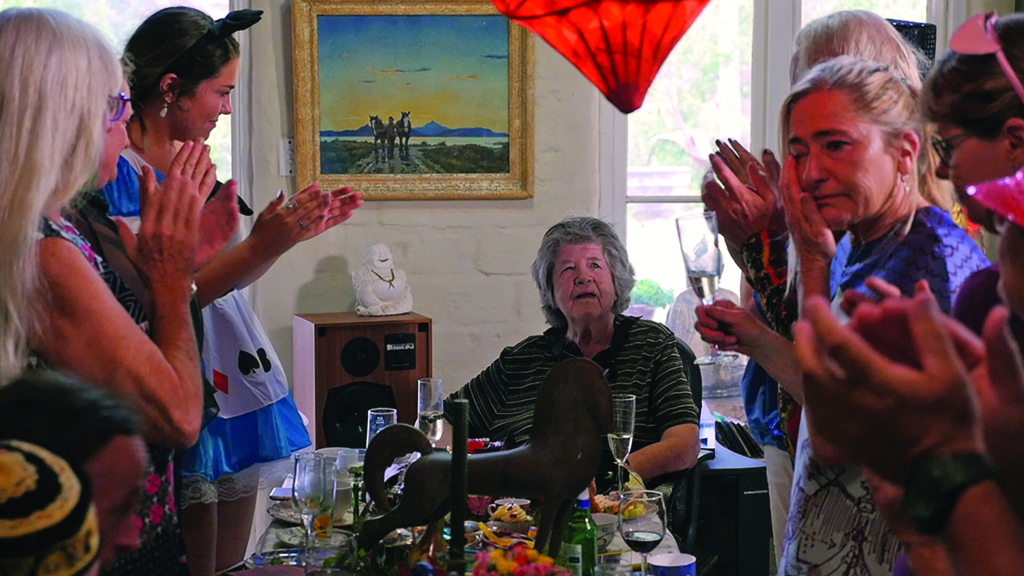
We all need to listen more, Cathy argues. She worries about the quality of nursing homes, the abuse many residents face there and the genuine fear many older Australians have about that. She’s also keenly aware that many parents don’t want to thrust themselves on their families in old age, and that many smaller families simply don’t have the means to accommodate them. While it’s complicated territory to navigate, Cathy believes it’s nonetheless important that we do so together:
My mother helped me to prepare for her death, and I would love to do the same for Sam. There’s a selfishness, in my generation, about how we talk about our parents, wanting them to hang on to the bitter end – never mind their suffering.
Cathy lectures on filmmaking at Edith Cowan University, and notes that just the other day she asked her students what they fear most, and the first response was ‘death’. ‘I think universities and high schools should have a place for talking about death,’ she says. Of course, Laura really should have the last word here. Speaking on old age while in Switzerland on the day of her death, she says, breathlessly:
It’s about time somebody talks about it the way it is, without all the fantasy and the hoo-ha. If I mention death [the response is], ‘Oh, you mustn’t talk about that. Suffering is good for you. It’s good for the soul.’ Okay, you suffer, and I’ll watch.
It is an honour to bear witness to their precious last moments together.
Endnotes
| 1 | Robert Bresson, Notes on the Cinematograph, trans. Jonathan Griffin, New York Review Books, New York, 2016 [1975], p. 5. |
|---|---|
| 2 | This article is based on a viewing of the feature version. |
| 3 | She has previously directed the environmentally focused documentaries The Burning Season (2008) and Rise of the Eco-Warriors (2014). |
| 4 | The Australia Institute, ‘Polling – Voluntary Assisted Dying and the Territories’, 2021, p. 1, <https://australiainstitute.org.au/wp-content/uploads/2021/04/Polling-April-2021-Voluntary-assisted-dying-and-the-territories-Web.pdf>, accessed 22 May 2021. |
| 5 | See Shannon Molloy, ‘Mareia Teh’s Agonising Final Hours of Life Haunted Her Daughter Belinda, so She Started Walking’, News.com.au, 6 August 2019, <https://www.news.com.au/lifestyle/health/mareia-tehs-agonising-final-hours-of-life-haunted-her-daughter-belinda-so-she-started-walking/news-story/e379d82f05c784a4c8bea78750246f8c>, accessed 24 May 2021. |
| 6 | See Laura’s Kitchen Table,<https://lauraskitchentable.circle.so/c/welcome>, accessed 22 May 2021. |
